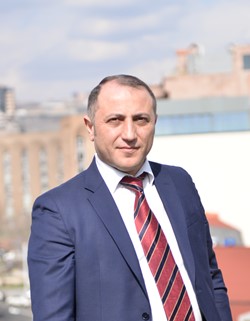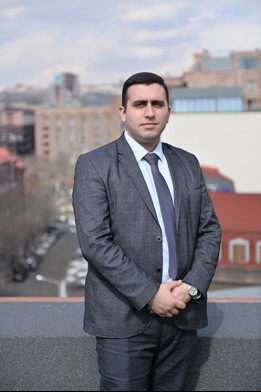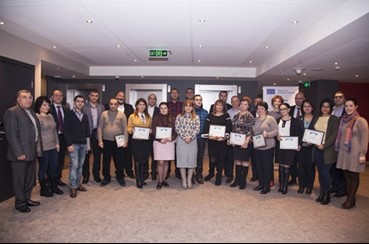An interview with Sevak Hovhannisyan, M4EG Initiative Country Coordinator for Armenia, and junior expert Grigor Baghdasaryan
- What makes Armenia stand out from other member states of Mayors for Economic Growth (M4EG) Initiative?

Sevak Hovhannisyan – In fact, there are several peculiarities. First, it’s the scale of cooperation with the state and community involvement. In April 2017, when the launch of the initiative was announced in Armenia, 87 communities expressed the wish to join it upon the request of the Ministry of Territorial Administration and Development, and this is an exceptional number for such a small country as ours. Later, 17 of them were merged with other communities as a result of amalgamation process and the number of engaged communities went down to 70. In 2018, Yerevan joined the M4EG Initiative and now overall 73 communities are included in our network.
The second specific feature is that as a result of the M4EG Initiative, the state decided to officially assign the functional area for economic development to a municipal staff member in all the amalgamated communities, as well as in those with over 5000 population. This function was introduced and assigned to civil servants in all the communities, not only those included in our network. So, institutionalization of the local economic development officer function on the community level took place.
And finally, the third peculiarity is establishment of a very strong network of those responsible for community economic development. At a first glance, they seem to be competitors and may be reluctant to share their knowledge and experience. However, we have the opposite situation: we have created a group in a social network online and the community representatives not only share their experience but also help each other.
Grigor Baghdasaryan – I would like to underline the fact that 16 out of 22 trained communities submitted their local economic development plans. Only 2 of them need to be improved, while 10 were positively assessed by international experts of the World Bank and 4 were given excellent feedback.
I’m delighted to mention one more thing: 8 of 16 persons responsible for economic development in the communities are women. This is exciting given the fact that only Etchmiadzin has a female mayor and she was only elected in 2018.
- What do you think are your main achievements as M4EG coordinators for Armenia?
Sevak Hovhannisyan – Initially, the programme didn’t have a financial component: the participants didn’t get any financial or material support, it was about only advisory and capacity building services. We had the concern that the community representatives would not be motivated enough to join the initiative. I think, our main achievement is that we managed to thoroughly explain to the participants our goals, motivate and support them patiently and consistently to define their vision of economic growth and elaborate the development action plans containing concrete steps.
 Grigor Baghdasaryan – I would also mention the right selection of participants and establishment and development of their network as an achievement. Today, those responsible for economic development exchange experience within both bilateral and multilateral cooperation projects, hold mutual visits and just socialize with each other, which I think is no less important.
Grigor Baghdasaryan – I would also mention the right selection of participants and establishment and development of their network as an achievement. Today, those responsible for economic development exchange experience within both bilateral and multilateral cooperation projects, hold mutual visits and just socialize with each other, which I think is no less important.
- What was the main challenge in your work and
how did you overcome it?
Sevak Hovhannisyan – For me the main challenge was to evoke the mayors’ interest and motivation towards the programme. Of course, the recommendation of the Ministry was out there but in many cases the mayors didn’t take seriously an initiative not envisaging direct financial flows to the community budget. Fortunately, as a result of personal meetings and discussions we managed to motivate them to show proper interest in the programme.
There is another challenge the solution for which mostly depends on the state – it’s community empowerment and enlargement of the financial basis for its realisation. According to the current law, the taxes charged from businesses are channeled to the state budget and not the local budget. This way, the communities are not that interested in the development of local businesses and business support infrastructure, as well as making the community more attractive for entrepreneurs. In comparison, in developed European countries a considerable share of the taxes paid by businesses goes straight to the local budget and thus the community has the financial means to address not only daily issues but also the community’s economic development, making it more attractive for investments. We hope Armenia’s new authorities will include this item on the public management and economic reforms agenda, which will eventually contribute to greater decentralization of power and empowerment of local self-government bodies.
Grigor Baghdasaryan - Additionally, I would point out the lack of available data which mostly results from the law on data confidentiality. It restricts the publication of statistical data on the community level. To address this issue, those responsible for economic development resorted to creative solutions to collect and analyse information on the economy of the community. We hope the Government and National Assembly of Armenia will solve this issue in near future as data transparency can tangibly contribute to the objective assessment of the current state of the communities and their development.
- Was there anything that surprised you during this process?
 Sevak Hovhannisyan – I was pleasantly surprised to meet such goal-oriented and positive people in our communities and see their diligence and excitement while participating in our capacity-building trainings. It was a discovery for me.
Sevak Hovhannisyan – I was pleasantly surprised to meet such goal-oriented and positive people in our communities and see their diligence and excitement while participating in our capacity-building trainings. It was a discovery for me.
Grigor Baghdasaryan – And I was surprised by the high level of trust between the participants and us. All our suggestions and recommendations were accepted with readiness and excitement and it is really binding.
- Did anything memorable or funny happen during this time that you would like to share?
Grigor Baghdasaryan – I would like to mention that all our participants have a great sense of humour and no single training passed without jokes which made the atmosphere very special and also productive.






